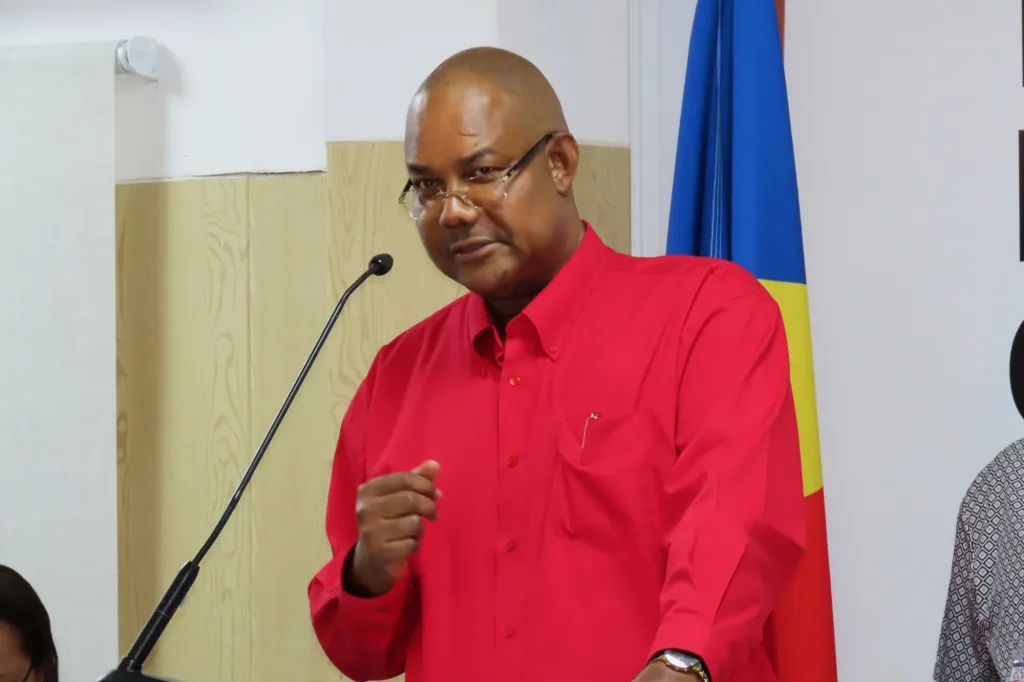
Patrick Herminie delivers speech after winning presidential election/AP
Seychelles is reputable as top global tourist destination.
Patrick Herminie, the opposition candidate, secured victory in Seychelles’ presidential election, overcoming sitting president Wavel Ramkalawan in a runoff, according to official results announced in the early hours of Sunday.
The results revealed that Herminie received 52.7% of votes cast, while Ramkalawan obtained 47.3%.
The United Seychelles party, which Herminie leads, previously governed the nation for 40 years until losing power in 2020. The party held control from 1977 through 2020.
Ramkalawan, representing the ruling Linyon Demokratik Seselwa party, was campaigning for a second presidential term.
“The people have spoken,” Herminie said in brief remarks after he was declared the president-elect.
“I am deeply humbled by the trust the people have placed in me, and I formally accept this mandate with gratitude, a profound sense of duty and an unshakeable faith in the strength and character of the Seychellois people.”
Between 2007 and 2016, Herminie held the position of speaker in the national assembly.
A parliamentary majority will enable his party “to work collaboratively and constructively to deliver the best possible outcomes for our people,” Herminie said.
Related: Guinea Set To Hold First Presidential Election Since 2021 Coup
The contest between the two leading candidates in the Seychelles election required a runoff after the first presidential ballot two weeks earlier failed to produce a clear winner.
While early voting commenced Thursday, the majority of citizens in the island nation cast their ballots on Saturday.
In their energetic campaigns, both Herminie and Ramkalawan focused on addressing critical concerns for voters, such as environmental degradation and a drug addiction crisis in a nation historically regarded as a tourist paradise.
The nation has earned a reputation for luxury and eco-tourism, propelling Seychelles to the position of Africa’s wealthiest country based on gross domestic product per capita, according to World Bank data.
However, dissatisfaction with the ruling party has increased in recent months.
Seven days prior to the initial voting round, activists filed a lawsuit against the government, contesting a recently approved long-term lease for a 400,000-square-meter (100-acre) section of Assomption, one of the nation’s 115 islands, to a Qatari corporation for luxury hotel development.
The lease agreement, which encompasses the reconstruction of an airstrip to enable international flight access, has generated extensive backlash for allegedly prioritizing foreign interests above Seychelles’ well-being and sovereignty.
According to the World Bank and the U.N. Sustainable Development Group, Seychelles faces particular vulnerability to climate change impacts, including rising sea levels.
The country is also grappling with a heroin-driven addiction crisis. A 2017 U.N. report identified the country as a significant drug trafficking corridor, while the 2023 Global Organized Crime Index indicated that the island nation has among the world’s highest heroin addiction rates.

 Tiwa Savage Launches Foundation To Support African Music Creatives
Tiwa Savage Launches Foundation To Support African Music Creatives  Gunmen Kidnap Six Church Members In Ondo State
Gunmen Kidnap Six Church Members In Ondo State  Violence Grips Mexico Following Death Of Drug Lord “El Mencho”
Violence Grips Mexico Following Death Of Drug Lord “El Mencho”  Netherlands Swears In First Openly Gay Prime Minister
Netherlands Swears In First Openly Gay Prime Minister  US Military Aircraft Land In Nigeria With Troops
US Military Aircraft Land In Nigeria With Troops  Tems Becomes First African Woman To Break Billboard Record
Tems Becomes First African Woman To Break Billboard Record